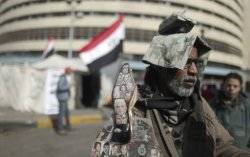Egyptians cast their ballots for the upper house of parliament, a largely consultative body with limited powers.
Turnout was light early Sunday morning in Cairo, one of 13 provinces where the first stage of elections for the Shura Council are taking place. A second stage will take place on February 14-15.
"We now feel we have a role in shaping the country's future," said Mohammed el-Hawari, a professor at Cairo's Ain Shams University, while casting his ballot in a polling center in the capital.
The series of elections for both houses of parliament are the first since Hosni Mubarak was toppled from the presidency on February 11 last year by a popular uprising.
The Muslim Brotherhood's Freedom and Justice Party, an Islamist group banned during Mubarak's rule, won 47 per cent of the seats in the lower house, more than any other party.
"The Shura Council elections are as important as the People's Assembly (lower house) elections," said Hussein Ibrahim, a member of the Brotherhood's Freedom and Justice Party and head of its parliamentary bloc.
"Members of both chambers will choose the committee that will draft the constitution, the milestone of Egypt's democratic transition," he said.
Under an interim constitution, parliament is responsible for picking the 100-strong assembly that will write a new constitution to replace the one that helped keep Mubarak in power for three decades.
Elections for the Shura Council have traditionally been less intense than those for the lower house due to the breadth of constituencies, which makes it harder for voters to know their candidates.
The Shura chamber's powers are limited and it cannot block legislation in the lower house. However, its members must be consulted before lower house MPs pass any bill.
Ninety of the Shura Council's 270 seats will be decided in the first round of voting to be held on Sunday and Monday, with run-offs on February 7. Another 90 will be determined by voting on February 14 and 15, with run-offs on February 22.
The remaining 90 will be appointed by Egypt's next president, expected to be elected in June according a transition timetable drawn up by the military council to whom Mubarak handed power nearly a year ago.
"The elected part of the Shura Council will convene without the appointed seats until presidential elections are held and the new president appoints the other 90 members," an official from the body overseeing the election told the Reuters news agency.
PHOTO CAPTION
An Egyptian protestor displays a shoe decorated with pictures of Egypt's ousted President Hosni Mubarak and other members of his government, during a protest outside the state television building in Cairo, Egypt, Sunday, Jan. 29, 2012.
Aljazeera


 Home
Home Discover Islam
Discover Islam Quran Recitations
Quran Recitations Lectures
Lectures
 Fatwa
Fatwa Articles
Articles Fiqh
Fiqh E-Books
E-Books Boys & Girls
Boys & Girls  Hajj Rulings
Hajj Rulings Hajj Fatwas
Hajj Fatwas














